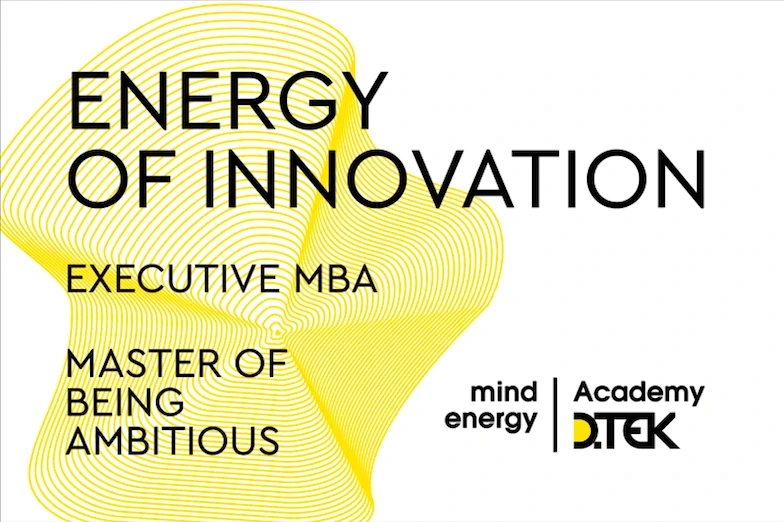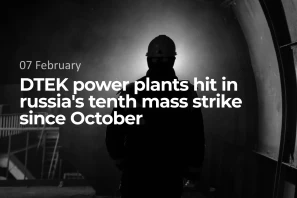COVID-19 has indeed become a catalyst and driver of rapid changes in markets, but above all, it changed us, our perception of the world, globalization, home and, just as important, work. In the 21st century, we start to live in a world without days off. Education at universities has been replaced by lifelong learning, and accordingly, business faces the following challenges:
• How to build a training system so that the process is continuous, flexible and individual?
• How to prepare employees for a smooth future retirement?
• How to shape an employee experience that transcends the physical work environment?
• And how to get retirees back to work, if necessary?
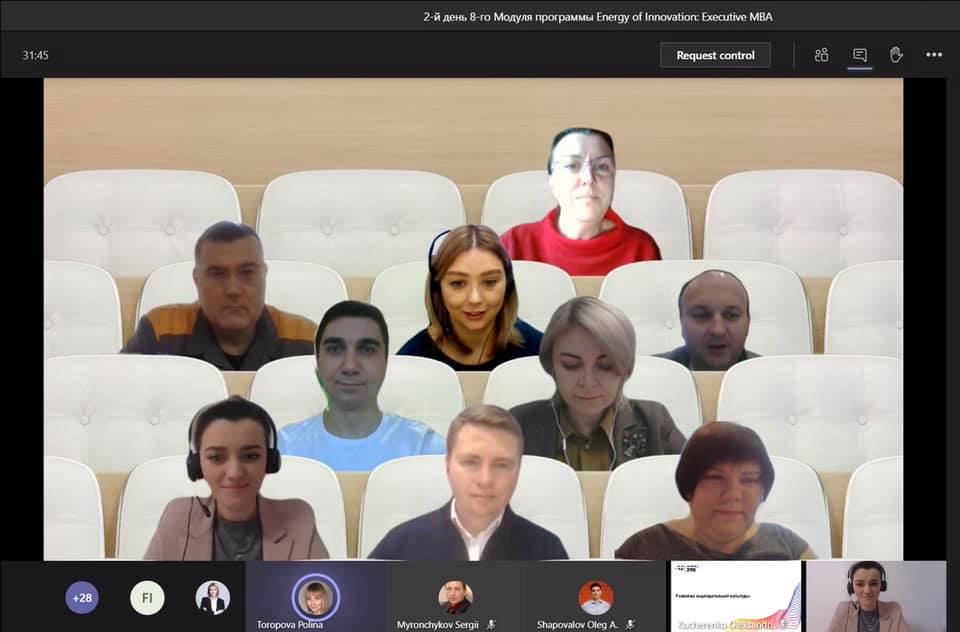
Olga Gorbanovskaya, Partner, Director of People Advisory Service EY Ukraine, launched the 8th module of the flagship program "Energy of Innovation", dedicated to people management and socio-political interactions.
Alexander Kucherenko, Director for Sustainable Development of DTEK, also noted that today the line manager is at the center of HR management, and the goal of Academy DTEK is to transfer HR knowledge to managers to form, grow and develop each manager and specialist in the company.
On the other hand, there is always valuable experience of top managers not only from other companies, but also from industries. For example, Renata Delporte, Senior Vice President, HRBP, Soft Serve believes that remote work will certainly become the norm for all of us in the post-COVID world. Employees will be divided into those who will work exclusively online (so you can be anywhere in the world, and companies will not need to open offices), the so-called “nomads” - those who will work both online and will go to the office and purely offline employees, which will be quite small. Moreover, very soon it is Generation Z that will become the majority of colleagues, and we must understand this generation, because it is really different: the younger generation perceives career differently, leadership and teamwork, and managers must take this into account, and companies must be attractive to young people in order to involve the best talents in teams!
Thus, the new conditions dictate new approaches and concepts of training, as well as a new look at talent management. Valeria Zabolotnaya, Rector of Academy DTEK, shared with the participants her thoughts on the future of talent management and noted that now the business trend is accelerating digital transformation. In a post-COVID world, companies will be forced to:
• Review your own talent development strategies (attract, retain and inspire).
• Strike a balance between optimizing existing employees and hiring new ones.
• Establish a continuous and dynamic approach to learning.
And the professor of international HR management at the Birmingham Business School (UK) Alexandros Psychogios opened the topic of performance management from the perspective of neuro-management. There is no “correct” answer based on experience or intuition to the question of what a manager should do in the context of changes both in the world and in the company. The answer becomes clearer after applying a flexible, so-called adaptive approach to management. Alexandros shared a 3 + 1 approach to performance management.
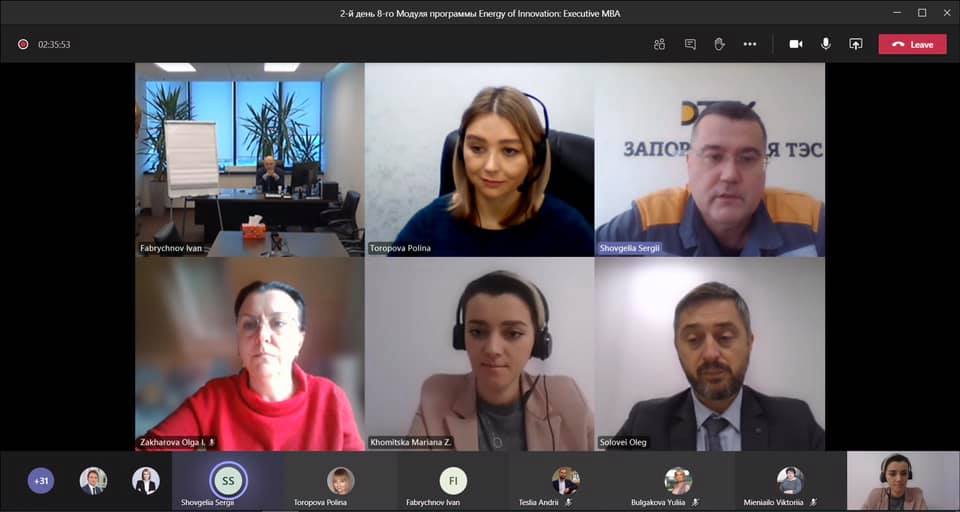
With Evgeniy Bondarenko, HR Director of Media Group Ukraine, the author of the first course for managers in Ukraine on people analytics, participants talked about modern HRM and how it can help businesses achieve strategic goals in theory and practice. Thanks to Eugene, participants created an employee experience map for solving business problems. Indeed, for the organization, its internal client - an employee - acquires no less importance than an external client and it becomes important which path he goes through and the experience he gets while working in the company.
The second part of the 8th module was devoted to GR and PR. Vasily Miroshnichenko, partner of CFC Big Ideas, which specializes on providing services in the field of strategic communications, immersed participants in the practice of advocacy and lobbying, tools for influencing regulatory policy and the sphere of professional services of GR. And Tatyana Skupova, Head of Communications and Marketing at D.Trading, who was previously responsible for corporate communications and GR at Philip Morris, focused on the most effective communication tools at GR. Yulia Burmistenko, Advisor to the General Director for International Relations of DTEK, spoke about international GR using the example of the company.
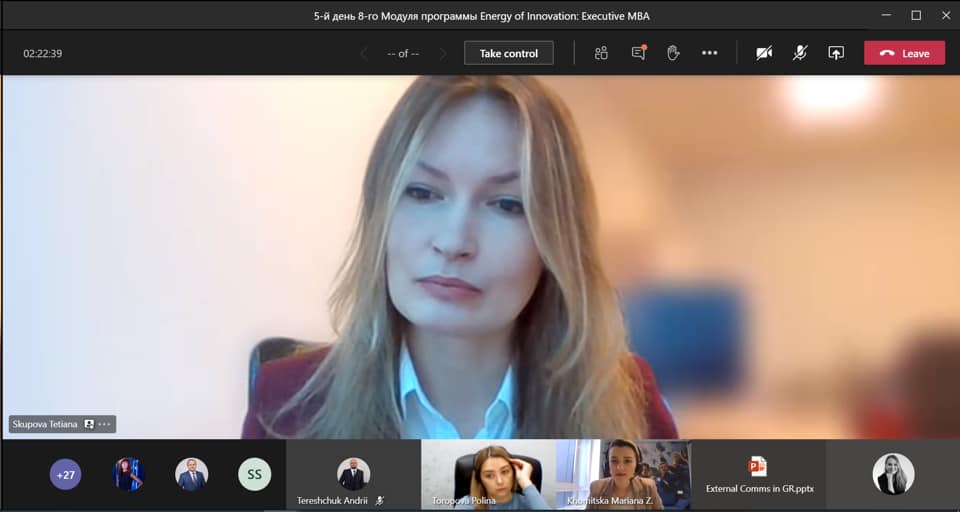
How the reputation “works”, where it “comes from”, why it “deteriorates”, participants discussed with Marina Starodubskaya, managing partner of the consulting company TLFRD, a lecturer at KMBS, and Diana Kladova, head of the communications department of DTEK Grids, shared the practical case of DTEK in the field of anti-crisis communications.
The module ended with a speech by Oksana Moroz, the author of the book “A nation of vegetables? How information changes the thinking and behavior of Ukrainians” and a discussion - why fakes in the head of employees are losses for the company, how information viruses modify the thinking and behavior of Ukrainians, and how 2020 transformed existing models of information perception.
"Energy of Innovation" is a practical EMBA-program at the management level of Academy DTEK. More about the program - https://emba.academydtek.com/ #energyofinnovation



